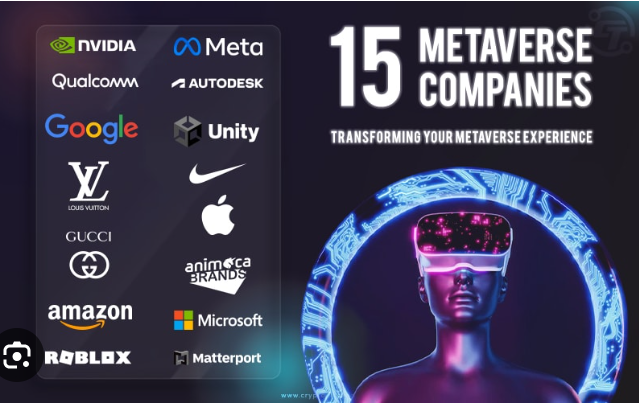
The metaverse represents an exciting new digital frontier that major tech companies are racing to conquer. As virtual worlds inch closer to mainstream adoption, a few leading firms stand out for their ambitious investments and innovations in metaverse technology. This article highlights the top metaverse companies pioneering the platforms, tools, and applications to make the metaverse a reality.
Defining the Metaverse
The metaverse refers to a persistent virtual shared space connecting multiple virtual worlds. Powered by virtual and augmented reality, users in the metaverse can interact through digital avatars. The metaverse may transform gaming, communication, work, shopping, and entertainment. Major tech players are developing the infrastructure to build an expansive network of interconnected virtual worlds.
Meta (Formerly Facebook)
Each discussion of the metaverse is complete with mentioning Meta. Formerly known as Facebook, Meta is steering the company toward becoming a metaverse pioneer. Their social VR platform, Horizon Worlds, allows users to explore virtual spaces as customizable avatars. Meta is developing VR hardware like the Oculus Quest 2 while researching innovations in digital fashion, 3D content creation tools, and simulated physics. With billions invested in metaverse development, Meta aims to make Horizon a mainstream social metaverse.
Microsoft
Microsoft is bringing the metaverse to businesses through Microsoft Mesh. This enterprise metaverse platform enables colleagues to join collaborative holographic experiences using AR/VR headsets or mobile devices. Microsoft Mesh integrates with popular Microsoft products like Teams, allowing virtual meetings. Microsoft’s cloud infrastructure and enterprise focus could make it a leader in metaverse software.
Nvidia
Nvidia produces leading graphics processing units (GPU) critical for real-time simulated metaverse environments. Their Omniverse platform provides the foundations for shared virtual worlds with features like simulated physics, photorealistic graphics, and collaborative design tools. With AI, analytics, and simulation expertise, Nvidia hardware and software may emerge as a preferred metaverse development platform.
Unity
Unity’s real-time 3D development platform powers over 50% of all mobile, PC, and console games. As a dominant gaming engine, Unity enables creators to build immersive, interactive metaverse experiences—unity acquired interactive streaming platform Parsec, signaling a focus on cloud-based virtual collaboration. The company’s ubiquitous game engine may give Unity broad reach in the consumer metaverse.
Roblox
Roblox operates an online platform where users create and share 3D gaming experiences. With over 200 million monthly users, Roblox has grown into a popular virtual world. Its avatar-based social gaming ecosystem offers a model for a thriving consumer metaverse. As major companies explore integrating brands and virtual commerce into Roblox, the platform provides valuable lessons for designing accessible metaverse spaces.
Cryptovoxels
Cryptovoxels demonstrates how blockchain and cryptocurrency can enable open virtual worlds. Users can purchase virtual land parcels as NFTs and build 3D creations like buildings, sculptures, etc. With a decentralized model based on user ownership, Cryptovoxels exemplifies a metaverse ecosystem fueled by digital scarcity and value.
Spatial
Spatial provides a virtual meeting platform harnessing 3-D avatars, augmented reality, and VR. It lets distributed teams collaborate via interactive, lifelike virtual workspaces. Spatial shows the practical business applications of metaverse technology in facilitating remote collaboration and online events. As hybrid work increases, Spatial may emerge as a preferred virtual office.
The Next Phase of the Internet
The metaverse represents the next evolution of the internet – persistent 3D virtual spaces that connect and unify virtual experiences. Major players like Meta and Microsoft aim to make the metaverse mainstream. Gaming platforms like Roblox and Unity enable user-generated worlds, while Nvidia and Spatial build specialized tools and infrastructure. As consumer and business interest grows, these metaverse leaders appear poised to shape the virtual worlds of the future. Their innovations lay the groundwork for the internet’s next chapter: an immersive virtual universe seamlessly interconnecting our digital and physical lives.

